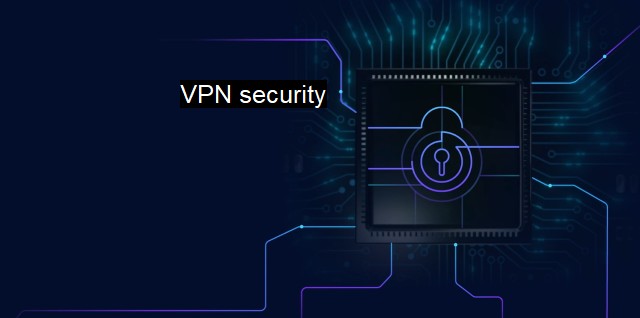What is VPN security?
The Crucial Role of VPN Security in Mitigating Cyber Threats: Ensuring Confidentiality and Integrity in the Age of Cyberattacks
VPN security, often referred to as Virtual Private Network security, is a form of cybersecurity that protects data transferred over the internet by coding it. Think of VPN security as a tunnel through an open, typically unprotected, public network from source to destination. As a system, it provides an additional layer of security to protect data and the integrity of digital communications.In layman's terms, a VPN consolidates the data into a packet - an envelope of sorts - to maintain the integrity and confidentiality of the information. Therefore, when a hacker attempts to intercept or infiltrate this data packet, they will only find encrypted data that makes no sense. this is the main purpose of VPN security: to ensure data protection from unauthorized access.
There are several features entailed in VPN security that specifically aim to safeguard digital traffic. To begin with, encryption is the primary component, as it scrambles data transferred across the internet. To unscramble, or decrypt, this data, a corresponding decryption key is necessary. Without this key, a potential infiltrator will only have access to encrypted, nonsensical information. Common encryption protocols include the Secure Sockets Layer (SSL), IPsec and the Transport Layer Security (TLS).
Another significant attribute of VPN security is the use of protocols defining how data is transmitted over a VPN. A variety of protocols exist that instruct how data is packaged for secure transfer. Protocols like OpenVPN, Point-to-Point Tunneling Protocol (PPTP), and Layer 2 Tunneling Protocol (L2TP) are commonly used. They cater to different needs, with some providing better security while others offer better speed.
The VPN servers also play a crucial role as they act as the endpoints of the VPN tunnel. When it comes to server security, different VPN service providers have varying policies highlighting how they possess and manage user data. For instance, some have a no-logs policy, which means they do not keep any records of a user's online actions, enhancing privacy and security.
Although VPN security offers a layer of protection, it should be paired with other cybersecurity measures for comprehensive protection. One such measure is the use of antivirus software. Antivirus software eliminates any potential risk from harmful software like viruses, ransomware, and other malware types that may be present in the user's system. When paired with a VPN, it forms a formidable two-pronged defense against potential cyber threats.
In a similar context, it is also feasible and strategically wise to combine the power of VPN security with the utility of firewalls. Firewalls are essentially the first line of cybersecurity defense and help curtail unsolicited network access. While VPNs encrypt and secure data in motion, firewalls work to prevent unauthorized access to the system, thus warding off threats at their basic level itself.
Understanding and leveraging VPN security involves acknowledging any potential vulnerabilities. A well-informed understanding of how VPN security functions and its potential weaknesses—like being susceptible to specific targeted cybersecurity attacks or major infrastructure attacks, how VPNs depend on trusted third-party providers, and availability concerns during network interruptions—is essential.
In the rapidly advancing tech world, VPN security is a vital tool in cybersecurity practices. Although not an end-all solution for protection against cyber threats, VPN security undoubtedly contributes a significant layer to the overall protection by reassuring that internet communications remain secure and private. Combined with additional measures like antivirus software and firewalls, VPN security helps create a fortified system against potential cyber threats.

VPN security FAQs
What is VPN security and why is it important for cybersecurity?
VPN security refers to the measures taken to safeguard your virtual private network from cyber threats. It is essential for cybersecurity because VPNs offer a secure connection that protects your online activities from hackers, snoopers, and other cybercriminals who try to access your personal data.How does VPN security work to protect my online activities?
VPN security works by encrypting your internet connection and routing it through a remote server, making it difficult for anyone to intercept your online activities. Additionally, most VPN providers offer advanced security features such as a kill switch, which automatically disconnects your internet connection if the VPN connection drops, protecting your data from being exposed.What are the risks of using a VPN without proper security measures?
Using a VPN without proper security measures can expose you to various cyber threats, including hacking, identity theft, and malware infections. For instance, if your VPN connection drops while you are accessing sensitive information online, your data could be exposed to cybercriminals. Additionally, VPNs without proper security measures may log your online activities, compromising your privacy.What are some best practices for ensuring VPN security?
To ensure VPN security, you should use a reliable VPN provider that offers advanced security features such as encryption, a kill switch, and DNS leak protection. Additionally, you should avoid using unsecured public Wi-Fi networks, which can compromise your VPN connection. Finally, you should keep your VPN software and antivirus software up-to-date to ensure that you are protected against the latest cyber threats.| | A | | | B | | | C | | | D | | | E | | | F | | | G | | | H | | | I | | | J | | | K | | | L | | | M | |
| | N | | | O | | | P | | | Q | | | R | | | S | | | T | | | U | | | V | | | W | | | X | | | Y | | | Z | |
| | 1 | | | 2 | | | 3 | | | 4 | | | 7 | | | 8 | | |||||||